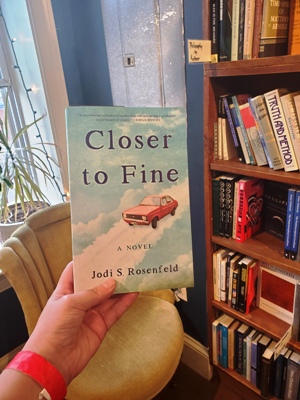I’m so feklempt that I finally had the chance to engage with newish DC bookstore, Lost City Books, thanks to the Jewish and queer communities! On June 1, author Jodi Rosenfeld, GLOE member Tamar Gasko and bookseller Shady Rose convened on Zoom to discuss Rosenfeld’s debut novel, Closer to Fine. It was named after a quintessential, ‘90s and queer Indigo Girls song you can listen to here!
Though the book has universal themes, like learning acceptance, navigating relationships and generational gaps, the ‘90s cast certain elements in a distinctive light. The queer community, such as it was back then, solely catered to gay men, lesbians and bisexuals, and everyone had to “pick a box,” Rosenfeld said. Conservative Judaism, the denomination to which Rachel belonged, was changing as well. Rachel was stunned when her synagogue hired a young, progressive, female rabbi to lead the congregation. (The conservative movement started ordaining women in 1985. Three decades later, at Adas, most of the clergy are female! Anywho.)
It’s the power of a strong story that although many of the situations were stuck in the last century, young, queer readers like Gasko still found it to be relatable. Throughout the hour they talked about the novel, and the state of Jewish and queer communities from the past through today. You can hear it for yourself by clicking on the recording here!
***
One week later, on June 8, Adas Israel closed out its 5771 adult learning series, MakomDC, with Dr. Joy Ladin. Ladin, a poet and English professor and Gottesman Chair at Yeshiva University, talked about reading the bible from a transgender perspective.
I appreciated her broad-minded view of the Torah, noting how rare it is for any human character’s identity to make it onto the page (or scroll.) She referenced Akedah specifically, and how we never get Abraham’s perspective from his identity as a father as he is preparing to sacrifice his son, Isaac. The reason for this broad, distant view, Ladin argues, is so we focus less on the humans and that Gd, who in Gdself is genderless and ergo “queer,” can stay in the frame.
When Ladin looks to “queer” the Torah, she focuses on in-text examples of characters who do not conform to gender and identity expectations. Our patriarch Isaac’s immediate family is a good example of that. His two sons, Jacob and Esau, present very different versions of masculinity—Esau is a burly, hairy, hunter; and Jacob is a more slender shepherd. Jacob, with the help of his mother Rebecca (who, in and of herself, strikes me as a biblical female character who is most proactive with her own agency,) steals the birthright from the older son, Esau. To break this social order, Jacob dresses in animal skins while visiting his father, in what some might term an over-performance of masculinity.
Isaac himself is the product of a woman, Sarah, who could be termed a “gender failure” by society’s expectations, in that she is unable to get pregnant for most of her life. When she finally conceives Isaac, at 90 years old, two different female identities—that of young mother and of old woman—come together as one. Isaac’s Hebrew name, Yitzhak, which means “laughter,” may be a nod to the absurdity of the situation. Absurdity, Ladin argues, not unlike transgender and non-binary people trying to fit themselves into a world that often relies on narrow definitions.
There were around 25 people in the Zoom chat, and during one discussion section, someone pointed out how Jacob, much like many transgender people, underwent a transformation and gained a new name. Jacob wrestled with…someone (most interpret this to be an angel,) and was renamed Israel. Was an illuminating moment in the discussion, where Dr. Ladin (and later Adas’s Rabbi Aaron Alexander,) shared with us the joy in uncovering new layers of Judaism’s holy texts.
The month continues with more local programming. You can join GLOE, Bet Mishpachah and the community this Friday at Pride Shabbat (and/or for a pre-Shabbat virtual cocktail mixer,) drag bingo and games next Tuesday, and a community service option for DC’s LGBTQ+ nonprofit, Casa Ruby, on Sunday, June 20.
The Capital Jewish Museum recently highlighted collections from David M. Green, a DC Jew and gay activist who died of AIDS complications in 1989, z”l. They encourage the local, queer community to donate archival materials in order for the museum “to reflect the community we represent.”
Happy Pride!


